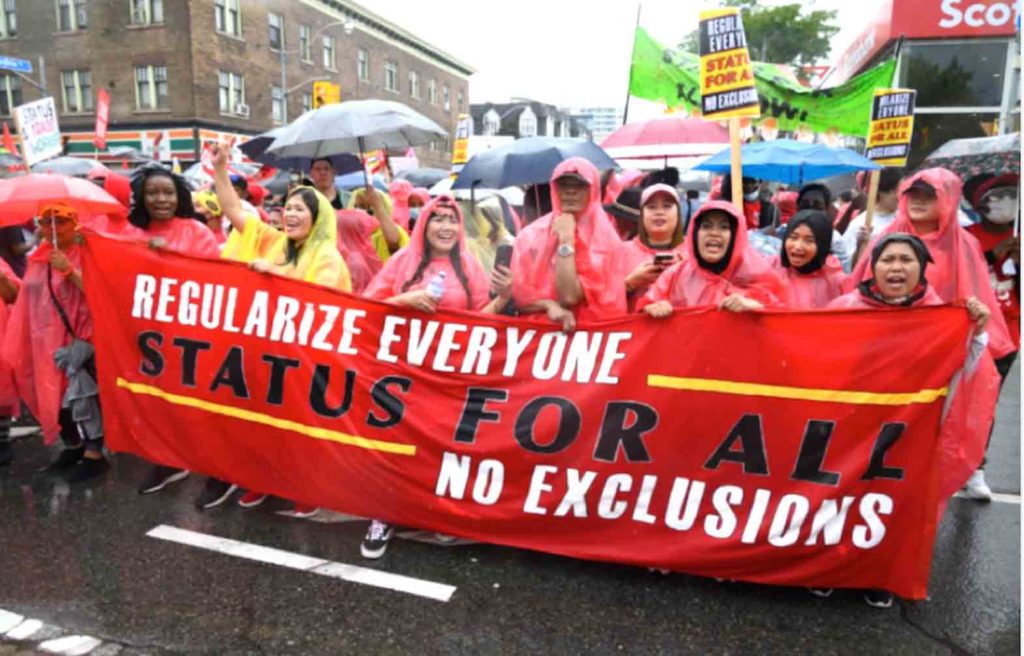Undocumented workers seek regularization during talk with Canadian gov’t

Migrants and their supporters urged Canada’s government to provide them a regularization program for permanent status. MRN
RED DEER, Alberta – Migrant rights advocates are keeping a watchful eye on Canada’s federal department of immigration, following last month’s dialogue between the department and some 150 undocumented migrants.
The department, Immigration, Refugees and Citizenship Canada (IRCC), and Hon. Sean Fraser who leads it, on November 14 met with migrants and their supporters, who urged the government to provide them a regularization program for permanent status. Undocumented Filipino migrants present at the meeting added voice to the campaign despite the risk of possible arrest and deportation.
Consulting with experts
IRCC is not disclosing its progress in designing a regularization program for the undocumented workers. But once it has finalized a program, an announcement will be made through IRCC’s official channels, said Remi Lariviere, media relations officer, in an email interview with INQUIRER.net.
“As we advance our work on further programs, we will continue listening to experts as well as undocumented workers themselves. However, we cannot comment on programs and policies that are in development,” said Lariviere.
The regularization of some 500,000 undocumented immigrants is one of the centerpieces of a mandate given by Canada’s Prime Minister Justin Trudeau to Minister Fraser, to “build on existing pilot programs to further explore ways of regularizing status for undocumented workers who are contributing to Canadian communities”.
The IRCC spokesman disclosed the department has been engaging with academic experts and industry stakeholders, including the Canadian Council for Refugees and Migrant Rights Network (MRN).
The policy framework will be based on previous programs that have successfully transitioned temporary foreign workers to permanent residency, such as the Out-of-Status Construction Workers Pilot.
“The Government’s response outlines a range of existing pathways to be expanded or adjusted to increase opportunities to transition from temporary to permanent residence, strengthen Canada’s ability to meet a wide range of labour needs and address long-term labour shortages, and support regional needs as well as communities across the country,” Lariviere further explained.
In 2021, IRCC granted permanent status to some 406,000 foreign nationals, nearly 169,000 of this number or over 41% were temporary immigrant workers.
More lobbying
The November 14 meeting yielded no definite answers for the group of lobbyists led by MRN, but gathering some 150 undocumented immigrants from across Canada was a feat itself despite all the risks, said Danilo de Leon, chairperson of Migrante Canada, a founding organization of MRN.
De Leon himself dodged deportation in August after a federal court deferred his removal pending judicial review of his case.
“Bringing in more than 100 undocumented (immigrants) in one big room is considered [a success] even if we didn’t get the answer that we wanted to hear from the immigration minister,” said de Leon in an interview.
The event heard stories from undocumented immigrants, stirring emotions as they shared stories of hardships and abuses especially during the height of the Covid-19 pandemic, said de Leon.
MRN places the number of migrants at 1.7 million, including those who are undocumented.
IRCC admits that no accurate figures represent the number or composition of undocumented migrant population in Canada. Data generated by academic research suggest there is anywhere between 20,000 to 500,000 members of this sector.
Underground
Calgary-based and former temporary foreign worker Licel (not her real name), a Filipina mother of a 6-year old Canadian child, was one of the more than 100 undocumented migrant workers who faced the minister in the November 14 dialogue.
In a written speech shared with INQUIRER.net, Licel said she works “underground” and for low wages in order to live. “For us there is nowhere to go so we have to endure all the pain because we need money to put food on our table and to feed our family back home,” the letter read.
Because they lack health care access, Licel and many others rely on home remedies and self-medication when sick.
Losing loved ones in their home countries means missing seeing them for the last time. “Once you decide to go home, one thing is for sure you cannot go back to Canada anymore,” said Licel, who lost her father in August.
Many undocumented immigrants attempt to regain status through the Humanitarian and Compassionate Grounds pathway. In her experience, Licel described the process as an “extremely difficult application,” with “overwhelming and stressful requirements and proofs”.
On December 1, MRN rallied its supporters to urge the 14 federal ministers in the Cabinet Committee on Economy, Inclusion and Climate “B” to support its “Status for All” campaign.
According to MRN, the committee is set to deliberate and lay down its decision on the subject, before sending its proposal to all ministers early next year.
“We need these 14 Ministers – and especially Prime Minister Trudeau – to support an uncapped program through which all undocumented people and their families can apply for permanent residency immediately. We need them to oppose any exclusions, or a program that gives just temporary status. And we need them to support permanent resident status for all 1.7 million migrants,” it said in a statement. #

